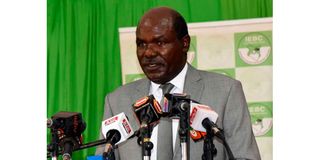IEBC: Parties to blame for gender impasse

IEBC chairperson Wafula Chebukati speaks to media on election preparation at Bomas of Kenya on May 23, 2022. The electoral agency says it has engaged political parties on the compliance with the gender parity rule since 2019.
What you need to know:
- IEBC has admitted that it has yet to devise an administrative mechanism to ensure the gender parity rule is realised during party nominations.
- In its response to a petition filed by lawyers Adrian Njenga and Cliff Ombeta seeking to stop the enforcement of the gender rule in the elections, the commission has also distanced itself from any blame or fault.
The Independent Electoral and Boundaries Commission (IEBC) has defended its failure to formulate rules and regulations for actualising the two-thirds gender principle during party nominations.
Admitting that it has yet to devise an administrative mechanism to ensure the gender parity rule is realised during nominations, the electoral agency has shifted the responsibility to political parties. It says the political outfits were supposed to formulate their internal gender parity rules first, before it can attempt to do the same.
In its response in court to a petition filed by lawyers Adrian Njenga and Cliff Ombeta seeking to stop the enforcement of the gender rule in the elections, the commission has also distanced itself from any blame or fault.
It says a court’s judgment that forms the basis of its decision to reject nomination lists that are not in compliance with the gender rule, obligated political parties to formulate their own regulations meant to actualise the two-thirds gender balance.
Previous court decision
“In the judgment delivered on April 20, 2017, the court directed political parties as the first point of call to take measures to formulate regulations for purposes of actualising the two-thirds gender principle during nominations,” says the commission.
“In default, the commission was to devise an administrative mechanism to ensure the two-thirds gender principle is realised during nomination.”
Through lawyer Chrispine Owiye, the IEBC, in its submission, said political parties cannot “shift blame and attempt to subjugate the commission whilst acting in violation of the Constitution and its principles that embody the ethical norms and values of the Kenyan people”.
Mr Owiye says the IEBC did not act beyond its powers by directing political parties, which failed to comply with the gender parity rule to revise the lists of nominees. He argues that in issuing the disputed notices, it was acting in fulfilment of its mandate.
“The directive to political parties to revise their nomination list was in discharge of the commission’s mandate to regulate the nomination process. The commission has the power to reject any list on account of non-compliance with the said rule,” says the lawyer.
The commission adds that it has engaged the political parties and reminding them about compliance with the gender parity rule and the existence of the orders of the High Court on the same since 2019.
Mr Owiye says IEBC held at least four engagement forums with the Political Parties Liaison Committee Steering Committee from 2018 to March 2022, and the gender parity rule was discussed.
The petitioners want the notices quashed, terming them draconian, unreasonable and inherently incompatible with the gazetted election calendar published on January 20, 2022. They accused the IEBC of failing to undertake public participation, a claim the commission dismissed.
The case will be heard today (25/05/2022).




